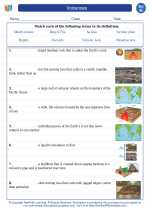Salinity
Salinity refers to the concentration of dissolved salts in water. It is an important factor in the health and balance of aquatic ecosystems, as well as in various industrial and scientific processes.
Factors Affecting Salinity
The salinity of water is affected by several factors:
- Evaporation: When water evaporates, the salts remain behind, increasing the salinity of the remaining water.
- Precipitation: Rainfall can dilute the salt concentration in water bodies, lowering the salinity.
- Runoff: The flow of freshwater from rivers and streams into the ocean can also lower the salinity of coastal waters.
- Sea Ice Formation and Melting: During the formation of sea ice, the salt is excluded, increasing the salinity of the surrounding water. When the ice melts, it introduces freshwater, lowering the salinity.
Measurement of Salinity
Salinity is commonly measured in parts per thousand (ppt) or practical salinity units (psu).
Effects of Salinity
Salinity can have various effects on aquatic organisms and ecosystems:
- Osmoregulation: Marine organisms have adapted to osmoregulate in high salinity environments, while freshwater organisms have adapted to lower salinity levels.
- Density and Buoyancy: The density of water increases with higher salinity, affecting the buoyancy of organisms and influencing ocean currents.
- Solubility of Gases: Salinity affects the solubility of gases in water, which can impact the availability of oxygen for aquatic organisms.
Human Impacts
Human activities such as agriculture, industrial processes, and urban development can affect the salinity of water bodies through the introduction of pollutants and changes in water flow patterns.
Study Tips
When studying salinity, it's important to understand the factors that influence salinity levels, the methods of measurement, and the ecological and human impacts of salinity changes in aquatic environments.
Key concepts to focus on include osmoregulation, density and buoyancy effects, and the solubility of gases in relation to salinity.
It's also helpful to review specific examples of how human activities can impact salinity, and to understand the importance of maintaining a balanced salinity level for the health of aquatic ecosystems.
.◂Science Worksheets and Study Guides Eighth Grade. Volcanoes
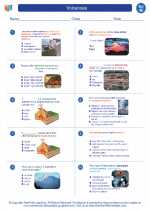
 Worksheet/Answer key
Worksheet/Answer key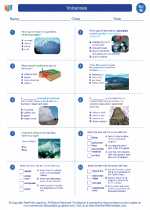
 Worksheet/Answer key
Worksheet/Answer key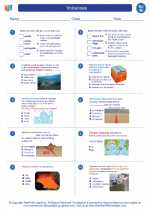
 Vocabulary/Answer key
Vocabulary/Answer key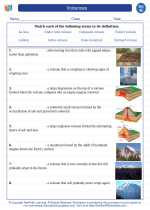
 Vocabulary/Answer key
Vocabulary/Answer key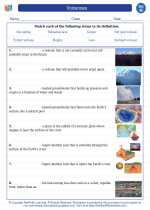
 Vocabulary/Answer key
Vocabulary/Answer key